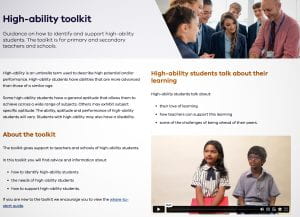Working closely with industry, a team of researchers from UNE’s School of Education has found that government tenders offer new scope to communicate research to schools and make a difference to student learning.
Since 2020, this team has successfully competed against other universities and private providers for three Victorian Department of Education tenders. These projects are designed to upskill teachers and school leaders in effective pedagogies for teaching high-ability students, and support the State’s agenda to enhance educational opportunities for students who may not otherwise have their needs met.
To date, the team has been successful in securing $1.28 million in funding, produced 35 instructional videos, 28 annotated lesson plans and over 30 pages of web content. Professional learning workshops delivered by the team have been attended by more than 1,500 participants, impacting on teachers’ and leaders’ professional practices and supporting school improvement.
The challenge of supporting high-ability students to reach their potential in non-specialist schools is internationally recognised. Victoria’s Department of Education is particularly invested in addressing the issue.
“These competitive tenders support research in collaboration with industry which provides significant benefits,” says Professor Sue Gregory, Head of the UNE’s School of Education.
“We’ve worked very closely with the Department of Education, school leaders, and teachers in schools to understand gaps in high-ability teaching and learning, then converted our research into materials to enhance the work of educators.”

Screenshot from the Victorian Department of Education’s UNE-developed High-Ability website.
Those teacher-focused materials form legitimate ‘non-traditional research outputs’, Professor Gregory observes. The research comprised 35 videos that communicate high-ability content to teachers in an easily-digested format.
Videos are a departure from the convention that research is communicated through peer-reviewed journal articles, Professor Gregory says. But backed by solid research, “videos are a valid format for contributing new knowledge to the field, and they have the potential to reach a broader audience than a journal article”.
The videos now form part of the Victorian Department of Education’s High-Ability Toolkit, developed by the UNE team, which is freely available online to teachers everywhere. The site recorded more than 160,000 views in 2022.
The UNE high-ability team uses traditional rigorous research methods to arrive at its non-traditional outputs. Team member Dr Genevieve Thraves, Senior Lecturer in Learning and Teaching and one of Australia’s foremost experts in high-ability education, explains that research is conducted across a cross-section of schools to identify gaps in support for high-ability leaners. The findings are used to shape resources for professional learning, like the high-ability video series.
“The knowledge we gain cumulatively informs our work as high-ability researchers; and it influences what UNE, as an educator of teachers, delivers to our cohorts of pre-service student teachers,” Dr Thraves says. “Outwardly and internally, these high-ability projects have had multiple benefits. We have recently been invited to tender to develop a new post-graduate course on the topic of high-ability, providing us with further opportunity to disseminate our research to shape contemporary practice”
To enhance research outcomes, the team have invested $80,000 of its high-ability tender successes to provide funding opportunities for researchers in the UNE School of Education. The Michelle Bannister-Tyrrell Memorial Research Scholarship was established which commemorates a respected and missed UNE ‘Gifted & Talented’ researcher who passed away in 2020. It provides an annual scholarship of up to $8,000 to support an early career researcher.
The team working on the high-ability projects include Professor Sue Gregory, Dr Genevieve Thraves, Professor Jennifer Charteris, Dr Joanna Anderson, Dr Sally Larsen, Dr Casey Mainsbridge, Ms Sarah Oluk, Dr Stoo Sepp, Dr Rose Mutuota, and Ms Donna Moodie.
Image: Unsplash



Recent Comments